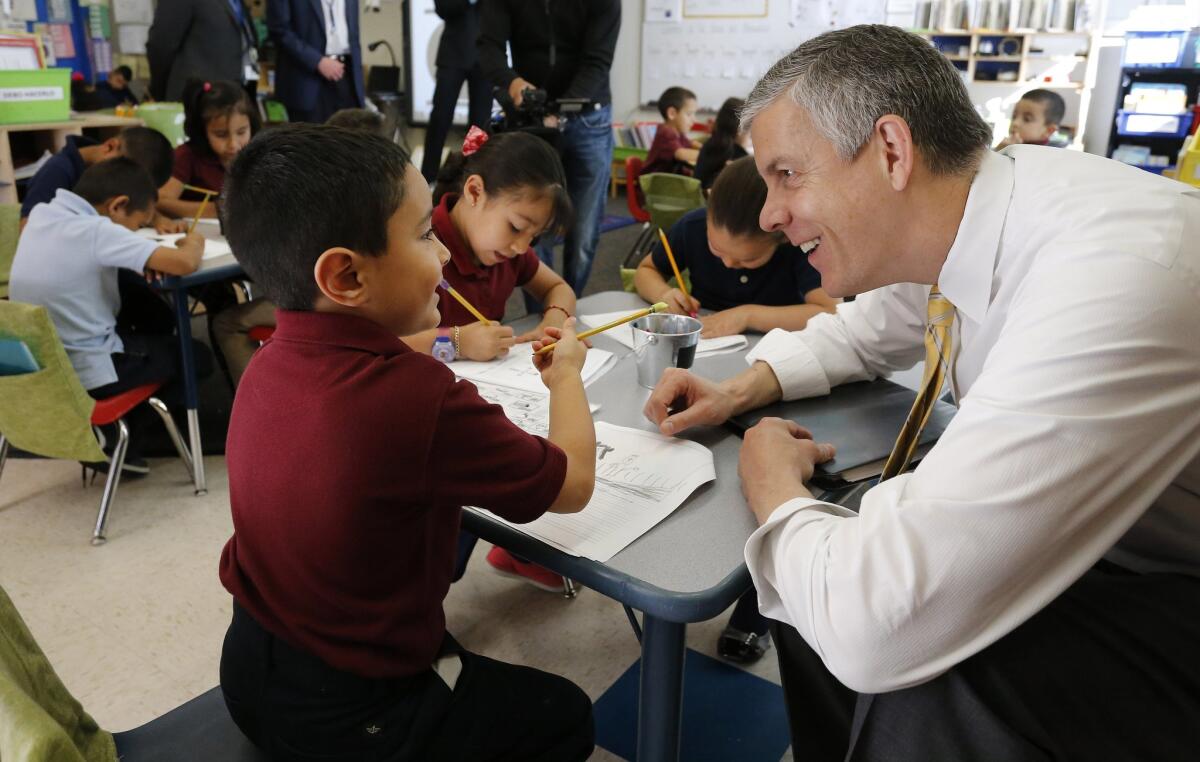No Child Left Behind replacement would give other states the freedom California has already claimed

Education Secretary Arne Duncan visits with students in Denver in May.
With No Child Left Behind one step closer to being a thing of the past, the governance of schools in other states is poised to look a lot more like California’s.
On Wednesday afternoon, the House overwhelmingly passed the proposed Every Student Succeeds Act by 359 to 64. The Senate is expected to vote on the measure before year’s end, and the White House has signaled President Obama’s willingness to sign it.
The bill would continue to require annual standardized testing in grades 3-8 and once in high school, and the results of different student groups will continue to be publicly reported. But for the most part, it will be up to states to determine what to do with those results.
The measure requires states to intervene in the bottom 5% of their schools, and in high schools with graduation rates below 67%, and where specific groups of students consistently underperform. For the most part, it will be up to states to determine how to identify those bottom-performing groups and how to intervene to make them better, as long as the interventions are “evidence-based.” To make these designations, in addition to test scores, states must consider other factors — such as school engagement and climate — but will have more leeway over how to count each one in their overall rankings.
California is already in the process of changing its school accountability system. As students prepared to take tests aligned with the Common Core this year, the state Board of Education voted to extend the suspension of California’s Academic Performance Index, a measure based on test scores. Instead, the board began devising a new system that includes factors such as attendance, how quickly students who don’t speak English are learning the language, college readiness, dropout rates and suspensions. By March, the state is slated to present a proposal to the Legislature about the new assessment system.
“California really has claimed the space that this bill now opens up,” said David Plank, a Stanford University professor and executive director of Policy Analysis for California Education. “With the Local Control Funding Formula, with the changes that have been made and are in progress on accountability policy in California, and with the implementation of Common Core, we’re really where the federal government now says states can go.”
In other words, “it catches up to where California may have already gone,” said Linda Darling-Hammond, Charles E. Ducommun professor of education at the Stanford Graduate School of Education and a member of the state’s Advisory Task Force on Accountability and Continuous Improvement. “A lot of states are looking to California.”
The Every Student Succeeds Act would replace No Child Left Behind, the much-maligned 2001 George W. Bush bill that dramatically expanded the federal government’s footprint in schools by requiring regular standardized testing and tying consequences — such as restrictions on certain school funds — to results from those tests. No Child Left Behind also included a goal of 100% proficiency by 2014, which turned out to be unrealistic.
Instead of those consequences, the proposed new law would hand responsibility back to states. “It formalizes and legalizes flexibilities that we’ve already claimed,” Plank said. “It puts the rest of the country in line with what California has already been doing.”
Under the proposed law, it would largely be up to the California Department of Education, Board of Education President Mike Kirst, state Superintendent of Public Instruction Tom Torlakson and the legislature to craft a plan that determines the state’s relationship with districts and their schools.
“We are encouraged that recent education policy shifts we have made toward more funding flexibility and greater transparency are manifested in the federal proposal,” Kirst said in a statement.
Torlakson praised the bill after its passage. “This legislation ushers in a new era in education,” he said in a statement. “I’m pleased that it follows the lead of California in so many important areas, including enhancing local control and providing more flexibility to the states to set up accountability systems that look at multiple measures of success rather than placing so much emphasis on one test.”
Since No Child Left Behind passed, a lot has changed. There is a broad consensus that looking at raw proficiency scores is a bad way of characterizing all the complicated things that happen inside a school. The Obama administration has acknowledged that states test their students too much. That concession follows a tumultuous period in which the federal government incentivized the use of test scores in teachers’ evaluations. And states have introduced the Common Core, an issue that made controversy over testing all the more relevant to parents.
No Child Left Behind was supposed to be rewritten in 2007, but Congress stalled. As a result, in 2011, the Obama administration invited states to apply for waivers from the law in exchange for agreeing to specific education reforms, such as revamped teacher evaluations.
California has a strong recent history of bucking federal dictates on education. Due to disagreements with Washington and some other factors, California has returned a federal grant it received to develop a database to track teachers, did not win money from the Race to the Top competition, and is one of just a few states without a No Child Left Behind waiver.
Instead, U.S. Secretary of Education Arne Duncan granted a waiver to a group of five California districts that were more amenable to his conditions. These districts, which include Los Angeles, are developing their own accountability systems based on multiple ways of measuring student achievement. Their proposals are expected to be a launching point for the state’s own system.
Former U.S. Rep. George Miller of Martinez, Calif., who was previously the ranking Democrat on the House Education and Workforce Committee, drafted the 2001 bill. For the most part, he is pleased. “Making sure that 95% of students take the assessments … is critical,” he said, but questions remain. “Are they [states] in fact with great clarity going to be able to tell parents how their children are doing, and if they’re on grade level?”
Rep. Mark Takano (D-Riverside), who taught English in the Rialto Unified School District under No Child Left Behind and now sits on the education committee, said he remembers “the sheer amount of time test prep took,” and how the law made it hard for him to tailor the curriculum for English language learners. He’s relieved that the new bill will allow California to develop its accountability program “without it being interfered with by the federal government,” but, he gives the bill a passing grade, and not an A-plus — in part because the rewrite, he said, could do more for California in terms of increasing school funding.
Eric Heins, president of the California Teachers Assn. union, favors the measure. “It supports us more,” said Heins, who is also the president of the state’s accountability task force. “We’ve been leading the way on a lot of the things that they’re incorporating into this new version, things like using multiple measures rather than relying on a single test.”
Duncan issued a statement of support as soon as the bill passed. “Nearly a year ago, I gave a speech setting the frame for what I believe is essential in the nation’s preeminent education law,” he said. “The bill that the House passed today reflects more of that vision than nearly any observer expected.”
You can reach Joy Resmovits on Twitter @Joy_Resmovits.
MORE ON EDUCATION
UC joins Bill Gates’ clean-energy coalition with $1-billion investment
PAC shielded $2.3 million in donations by L.A. charter school backers
L.A. Unified sees success in counseling rather than arresting truants and kids who fight
More to Read
Start your day right
Sign up for Essential California for news, features and recommendations from the L.A. Times and beyond in your inbox six days a week.
You may occasionally receive promotional content from the Los Angeles Times.







